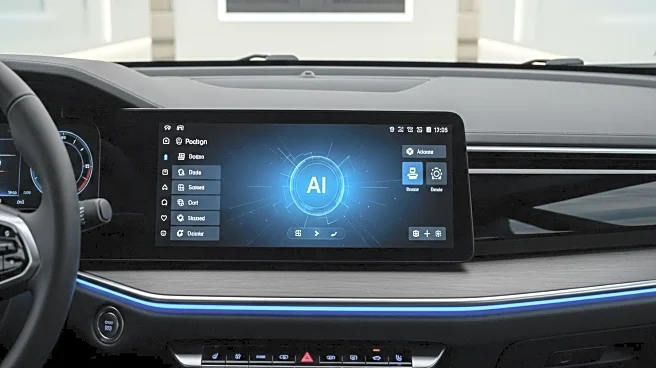What's Happening?
Rivian Automotive, an American electric vehicle manufacturer, has made a strategic decision to exclude Apple CarPlay from its vehicles, according to CEO RJ Scaringe. During an interview on the Decoder podcast, Scaringe explained that Rivian aims to provide a seamless digital experience by developing its own ecosystem of apps and integrations, such as YouTube, Apple Music, and Google Maps. He believes that this approach will be crucial as artificial intelligence becomes more integrated into vehicle operations. Scaringe argues that supporting CarPlay would hinder Rivian's ability to offer advanced AI features, which are expected to enhance the driving experience by connecting various applications and making informed decisions based on vehicle state, driving history, and user preferences.
Why It's Important?
The decision by Rivian to exclude CarPlay highlights a significant shift in how automakers are approaching in-car technology. By focusing on its own ecosystem, Rivian is positioning itself to leverage AI advancements, potentially setting a new standard for digital experiences in vehicles. This move could influence other automakers to reconsider their reliance on third-party systems like CarPlay, impacting the broader automotive industry. For consumers, this could mean a more personalized and integrated driving experience, although it may also limit compatibility with existing Apple devices. Rivian's strategy reflects a growing trend of tech-driven innovation in the automotive sector, which could lead to increased competition and collaboration between tech companies and car manufacturers.
What's Next?
Rivian plans to introduce new features over the next 18 months that will utilize AI to enhance vehicle functionality. These developments are expected to include integrations that connect different applications and provide a richer user experience. Scaringe mentioned upcoming integrations, such as car key support and messaging, indicating that Rivian is actively working to expand its digital offerings. As Rivian continues to develop its ecosystem, the company may face challenges in convincing consumers of the benefits of its approach compared to established systems like CarPlay. The automotive industry will likely watch Rivian's progress closely, as its success or failure could influence future technology adoption strategies.
Beyond the Headlines
Rivian's decision to exclude CarPlay raises questions about the balance between proprietary technology and consumer choice. While Rivian aims to offer a unique digital experience, it may face criticism from users who prefer the familiarity and compatibility of CarPlay. This situation underscores the ethical considerations of technology integration in consumer products, where companies must navigate the tension between innovation and user autonomy. Additionally, Rivian's approach could have long-term implications for data privacy and security, as the company collects and utilizes extensive data to enhance AI-driven features.










